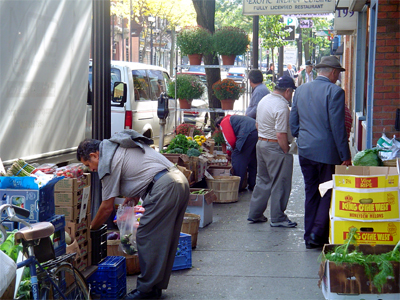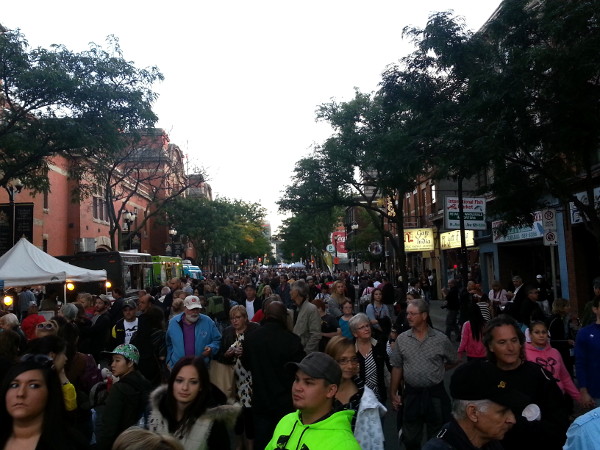Love of the old times is important, but we should not canonize the neighbourhood's past at the expense of its future, which is looking increasingly bright.
By Mark Robbins
Published September 27, 2017
Golden Ages are a funny thing. Aside from the odd superficial proclamation of a "Golden Age" at some ribbon cutting ceremony or launch of a new government program, Golden Ages are almost always declared in retrospect. This is because a Golden Age is a romanticized version of the past that cherishes the successes of the time while glossing over its struggles.
There are not clear moments where a Golden Age starts and ends, it's really more how we remember the character of the time period, especially after some part of it has been lost to the present. That is to say, we are seldom aware of a Golden Age when living in it and you only know that a Golden Age has occurred well after it is over.
You can probably see where I am going with this. Yes, I am sorry to say it, folks, but it may well be time to start thinking about what the Golden Age of James Street North used to look like.

Vendors on James North (RTH file photo)
The James North of our memory was a place for bohemians, artists, addicts, the free-spirited, crooks, creatives and everyone in between. A community for anyone that lived an alternative lifestyle, but still a place that was accessible to outsiders, if just barely.
In James North's Golden Age, there were a few nice galleries and lots of, ahem, other ones. I recall once entering a derelict building that could have easily been a squat. Inside, the paint was peeling off the walls and the lack of lampshades and plaster that left the brickwork exposed was due to genuine decay, not fashion. Nobody greeted us or explained the art that had been created that day, which you could smell still drying on the canvasses. Instead, we were led into the back room where a few dozen artists and their friends played the guitar, sang improvised songs and smoked pot. Those looking for freedom and escape found it on James North.
It was a paradise for Romantics and the area teamed with the colourful and eccentric. You could live on the cheap in a 200 year-old building with a charming amount of deterioration, and that living arrangement would permit you the income to just be and do.
Food was inexpensive and authentic. Ingredients were local out of necessity and due to an abundance backyard gardens - not for the sake of conspicuous consumption of "organic" and "local" products.
Life on James North during the Golden Age was once explained to me by way of an unforgettable analogy. "Living on James North is like... Well, let me put it this way. I was woken up last night by a drunk man loudly serenading a prostitute. He then offered her a bouquet of flowers he had just pulled out of someone's' garden." Ah la joie de vivre. That salacious boheme could be any old Hemingway, driven by passion and living with reckless abandon for tomorrow. This is the Golden Age that's catalyzing in our collective memory, and it is a beautiful way to remember the past.
Today, the James North experience is very different. Upper-middle class Torontonians driven by Yelp ratings are flocking to James North to soak in the culture and to Instagram their meals, and in far greater numbers than restless eccentrics come for the freedom and lack of social expectations.
People buy their pot from clean and professional marijuana discrepancies, they see increasingly high profile bands whose songs are available on iTunes, and they buy the local artists' prints because there is too much demand for everyone to get their hands on an original. What used to be a casual romp through the art galleries is now a Supercrawl where are local artists are increasingly relegated to the sidelines.

Big crowd on James North for Supercrawl (RTH file photo)
Old buildings are rebranded as "lofts" and the skyline is filling up with new glass condo towers. Certainly, there is something that is being lost in James North, that's why it makes sense to opine of its Golden Age now.
But as with any Golden Age, we are too quick to gloss over the bad parts. Remember that drunken scalawag singing in the middle of the night? Actually, he woke up the whole neighbourhood and destroyed someone's' garden, all while publicly trying to pay for sex.
Sex workers regularly roamed the streets (our family pet was kidnapped and ransomed by one, I shit you not), artists couldn't live by their craft, drugs were sold in open air and the word "building" was often associated with "decay", but never with "construction".
I think of an old friend who grew up in James North but would refuse to visit during the "Golden Age" because it was "too dangerous" and "really scuzzy". Likewise, the Romanticized image of Hemingway's Paris is overshadowed in the minds of Parisians of post-war filth and decay of Montmartre as a place that "decent people didn't want to go".
Certainly, something is getting lost in James North's newfound success, but what exactly? Keeping alive that spark that makes it special is going to be an uphill battle amid all the new activity, to be sure. But rather than heading straight to lamentation, let's be glad for a moment that the hardest days are over for James North.
Love of the old times is important, but we should not canonize the neighbourhood's past at the expense of its future, which is looking increasingly bright.
Talk with the real veterans of James North, the shop owners, the people having a smoke out on the stoop, or at one of people playing cards at an Italian or Portuguese social club. They will tell you about the relief they feel that the world is finally streaming back into the community after the "bad old days". And if you are patient enough and really listen closely, they will tell you what it was really like to live through the "Golden Age" of James North.
By RobF (registered) | Posted September 27, 2017 at 08:38:18
Love of the old times is important, but we should not canonize the neighbourhood's past at the expense of its future, which is looking increasingly bright.
I agree, but let's not confuse nostalgia and sentimentality with regard to a past that is always more complicated than any golden age rendering allows (the smokestacks are always gilded and poverty turned noble, rather than also polluting and immiserating respectively) with passivity toward the future.
The future is as yet unwritten, but it is in the process of being written by some more than others. Let's not gloss over that. You don't have to romanticize the past (that never quite was) to act in the present with others to make the road to the future more equitable and broadly shared than it might otherwise turn out to be.
Or as someone seemed to be saying on CBC Hamilton recently: you can just sit on your front porch and watch it all happen.
You must be logged in to comment.
There are no upcoming events right now.
Why not post one?